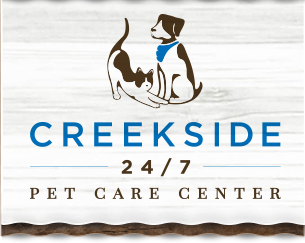Our top priority for your pet’s surgery is to keep them
SAFE & HAPPY
We use state-of-the-art surgical equipment and prioritize educating our clients, so you know the appropriate aftercare for your pet.
Veterinary surgery can range from a common spay or neuter procedure to the more complex surgeries, such as mass removal, bladder stone removal, abdominal exploratory, foreign body removal and splenectomy. Whether it is a scheduled elective procedure or an unexpected health issue that has prompted you to seek surgical care for your pet, Creekside’s expert hospital staff has the experience to handle a variety of veterinary surgeries using the most advanced techniques.
Anesthesia is commonly used in veterinary surgery to keep your pet comfortable and free of pain during a procedure. Although technological advancements have made anesthesia and surgery very safe for pets, some risks still exist. To decrease these risks, we require all patients undergo a physical exam prior to surgery, and we also conduct a pre-anesthetic blood screening before any anesthetic procedure. This blood panel will help reduce anesthetic risks by ruling out many internal problems, including clotting disorders, liver and kidney abnormalities and anemia. In addition to the examination and blood screening, we also place an intravenous catheter and administer fluids to help keep your pet hydrated and maintain blood pressure during the procedure.
In addition to constant supervision by the surgery technician, your pet will also be monitored with state-of-the-art equipment, including an ECG to monitor heart activity, a non-invasive blood pressure monitor and a pulse oximeter, which measures heart rate and oxygen concentration levels. Rest assured, only the safest, most effective and latest anesthetic and pain-control protocols are utilized. Our surgery suite is also equipped with heated surgery tables for increased patient comfort.
SPAY & NEUTER
SOFT TISSUE SURGERY
Soft tissue surgery refers to procedures that are not associated with the bone. A few examples, indications and benefits are listed below:
- Lump or Mass Removals
one of most common soft-tissue procedures is removal of lumps, masses or tumors. whether located internally or externally, it is important not only to remove them, but also send them for pathology testing. this testing not only confirms whether the lump or mass is benign or malignant (i.e., cancerous), but it also ensures complete removal of all problematic cells. - Foreign Object Removal
unfortunately, pets may ingest things that they are not supposed to, leading to stomach or intestinal obstruction. when this occurs, many times surgical correction is required. - Splenectomy
sometimes tumors (whether benign or malignant) of the spleen can cause bleeding inside of the abdominal cavity requiring removal of the spleen to stop the internal bleeding. - Pyometra
pyometra is a severe and life-threatening infection of the uterus of female pets. when this occurs, removal of the uterus via overiohysterectomy (i.e. spay) is required. - Laceration Repair
lacerations are common in pets, and surgical correction will reduce the chances of infection, improve healing time and reduce scarring. - Aural Hematoma
sometimes ear infections result in shaking of the head or clawing at the ear. in some instances, this can cause a blood vessel to burst inside the earflap, requiring a procedure to correct and allow proper healing and pain relief to occur.
What to Expect
If surgery is necessary in your pet’s case, we will provide him or her with the highest degree of comfort and care possible. While the use of anesthesia is generally harmless for pets, we always administer a thorough head-to-tail examination prior to the procedure to determine the safest surgical plan of action to be sure there is no hidden condition that could compromise your pet’s well-being during the prescribed veterinary surgery.
Once we have a full working knowledge of your pet’s condition, we will guide you in how to prepare your pet for surgery.



